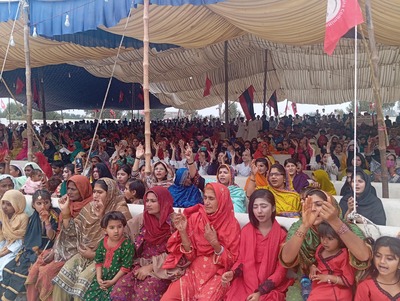Pakistan: Peasant unions to mobilize on April 13 against corporate farming, land grabs, and for fair crop prices
Peasant unions, including the Pakistan Kissan Rabita Committee (PKRC), have announced a nationwide protest on April 13 to oppose the so-called Green Pakistan Initiative, which they claim is a front to open up the country’s agriculture sector to corporate farming. Marches, village meetings, and town hall conventions are being planned across the country.
The Green Pakistan Initiative – $3.3 billion project – is a federal government program aimed at converting uncultivated land into high-yield, industrial farms using artificial intelligence and advanced irrigation technologies. However, peasant unions and activists have raised serious concerns that this shift toward large-scale agribusiness could marginalize small landowners, displace rural communities from public lands, commons and limit their access to crucial agricultural resources.
According to the protesting unions, thousands of farming families across several districts of Punjab are being displaced from their lands, which are allegedly being handed over to corporations. Despite court orders recognizing these lands as common property of the peasants, the government is reportedly ignoring their ownership rights and attempting to lease the land to corporations for periods of 30 to 50 years.
The peasants say they are resisting the move and refusing to vacate their land, despite the use of police force, particularly in Arifwala and Hasilpur. They also allege that the government has started issuing sharecropping notices to farmers. The unions allege that local state department officials are demanding billions of rupees in arrears from farmers, while police are being used to forcibly obtain thumbprints on ownership documents, according to the unions.
Rejecting corporate farming, the unions are calling for genuine and comprehensive agrarian reforms, including the equitable distribution of land to support agricultural development. They propose that state land be redistributed among landless peasants, rural poor, women, youth, and small-scale farmers – and be used for agroecological production and to build local agrifood systems.
Criminalizing Protests
On April 10, at the Ehsan Pur Seed Farm in Kot Addu, while peasants were harvesting wheat, local authorities intervened, arresting three farmers and confiscating their tractor trolleys. The incident sparked outrage in the local farming community. In response, peasants and their families took to the streets, staging a protest and blocking the road. Their pressure led to the release of the detained farmers and the return of their confiscated equipment. The core issue, protesters say, is the alleged plan to lease these lands to corporate entities under the pretense of promoting “corporate farming.” This move, they argue, threatens to displace farmers who have cultivated the land for generations—some for over a century.
The PKRC has strongly condemned the administration’s actions, particularly the reported violation of a court-issued stay order. The group is demanding the immediate suspension of the police officers involved and a full investigation into the incident.
Large Canal Project threatens livelihoods and marine lives
The April 13 protest will also highlight opposition to the construction of large canals in the South Punjab region.. Pakistan plans to build six canals under an ambitious agricultural project under the Green Pakistan initiative. Critics argue that the canal project, has not carried out the necessary environmental impact assessment and would reduce the downstream water flow of the Indus, accelerating sea water intrusion, and affecting the lives and livelihoods of riverine communities in the region. The canal could also impact mangrove forests, that act as storm buffers and are also critical fish breeding grounds. In the Singh region, there are fears that the canals would accentuate water scarcity due to water diversion.
Roll back of Price Support Programs
Demonstrators are also calling for fair pricing for wheat produced in the region. The protest comes at a time when the Punjab government is moving toward liberalizing the wheat market. Nearly a year ago, similar protests erupted after imported wheat—brought in following the devastating 2022 floods—flooded the market and caused prices to plummet.
In late 2024, under pressure from the International Monetary Fund (IMF) to cut subsidies, the Government of Pakistan began dismantling the Minimum Support Price (MSP) mechanism for wheat—a longstanding policy that had provided a critical financial safety net for millions of farmers.
In February 2025, the government officially withdrew the MSP for wheat. This rollback of price protections has triggered a dangerous ripple effect across Pakistan’s agricultural and food systems. Smallholder farmers, in particular, are now exposed to severe market volatility, with no guaranteed price floor. Without the MSP, they are increasingly vulnerable to exploitation by middlemen and private traders, deepening the economic insecurity of rural communities.
The nationwide agitation planned for April 13 is set to spotlight all these issues, with peasant unions pledging a united stand against the growing corporatization of Pakistan’s agricultural sector.













